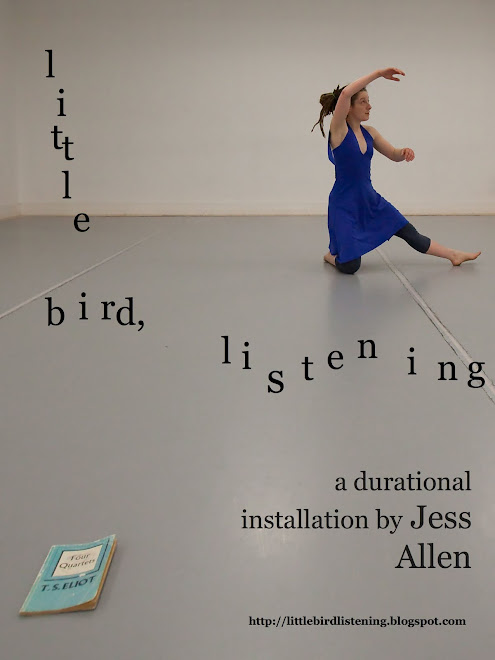Looking for a book to read one day, the little girl (age 6; maybe just a little bit precocious) stumbled upon a little paperback so slim, she thought it must be a story for children. Her mother said it wasn't, but when she opened it up, the words looked easy enough, in short little lines & so she started reading out loud to her surprised, laughing mother:
"Time present and time past
Are both perhaps present in time future
And time future contained in time past.
If all time is eternally [this word was a bit hard] present
Are both perhaps present in time future
And time future contained in time past.
If all time is eternally [this word was a bit hard] present
All time is unredeemable... [and she might have stopped here because she definitely hadn't seen that word before]..."
-----------------------------
This work was originally conceived as a reflection on our perception of time. Reading and listening to the work of the Eagleman laboratory, I was drawn to the notion that our perception of time is determined by the density at which we lay down memory
-----------------------------
This work was originally conceived as a reflection on our perception of time. Reading and listening to the work of the Eagleman laboratory, I was drawn to the notion that our perception of time is determined by the density at which we lay down memory
"When you’re a child, everything is new, so you’re laying down very dense memories about everything that’s going on. By the time you’re older you’ve seen it all before; your brain doesn’t have to write as much stuff down. So when you get to the end of a childhood summer and you look back it seems like it took forever. But when you’re an adult and you look back, you just haven’t written down that same density of memories, so it seems like it flew by. You can make your life seem longer by doing things that are novel each day."
Inevitably, thinking about time, I found myself returning to Eliot's Four Quartets (maybe because I imprinted it on my memory at such a tender age) and got no further. First published together in 1944, they are some of the most famous and well-regarded twentieth century poems to deal with the nature of time. But they hold an equal (and related) significance for my small family as a unifying thread that has (until now) surreptitiously linked our lives with colourful stories. In particular, our one slim copy of these poems is rich with such traces: the scribbled marginalia of my mother’s literary analysis; her biro-ed (and comically posh) lessons in the use of punctuation (for me, age 7) on the frontispiece; the notes she later wrote on page 45 for her own mother’s epitaph. This was also that the volume that I'd picked up age 6, deceived by its slimness. All this on the faded armchair where I was so often read to, or slipping down the side of, lulled to sleep by my mother’s sonorous voice on another endless telephone call. One volume, three generations of women, one cat (called Eliot), a telephone and a lot of talking out loud….
All this weaves together the time and distance that now lies between me and my mother (who doesn't travel beyond her self-imposed forcefield at a 10 mile radius of Aberystwyth) and my hometown, geographically, and between who we are now and who we were then, temporally.
So that's it, my starting point: one huge and hugely famous set of four long poems, in two battered copies (one here, one in Aber), a mother and a daughter (one in Aber, one here), a mobile phone and three scores: (1) IWILLLEARNALLTHEWORDS (2) i will move and speak at the same time (3) when i can't speak any more, i will listen to my mother (for the first time, ever).
Like the little bird, listening in the tree.
my grammar and punctuation lessons (age 7)
mum's literary marginalia
my mother's notes for my grandmother's epitaph (in Welsh)







Beautiful. I think about your point about the density of memories and time passing all the time and while i reckon you have got the main one these are probably compounded by a few other factors.
ReplyDeleteFirstly children tend to have a lot more free time and not having tasks throughout the day can make it go slower. Second this idea that you gauge time relative to how much you have experienced so a year to someone who has experienced 50 rather than 5 seems like less. Finally some people argue that as your reaction time slows as you get older you physically experience less time.
Whatever te reason is fact of life that is good for getting through tough times but bad for savouring the good. . . An evolutionary accident or a useful survival skill?